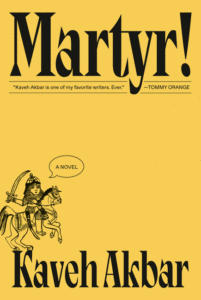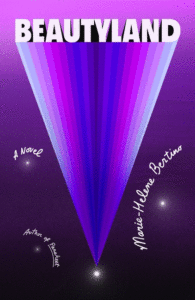
Hisham Matar’s My Friends, Adam Shatz’s The Rebel’s Clinic, Kaveh Akbar’s Martyr!, Simon Shuster’s The Showman, and Álvaro Enrigue’s You Dreamed of Empires all feature among January’s best reviewed books.
1. You Dreamed of Empires by Álvaro Enrigue, trans. by Natasha Wimmer
(Riverhead)
12 Rave • 3 Positive
Read an excerpt from You Dreamed of Empires here
“Enrigue presents us with two societies that feel far removed from our modern sensibilities, one of which—the Aztec empire—has often been shoddily reproduced, its complexity buffed away … The intricacy of this series of events might have daunted many writers; it’s difficult enough just to portray it accurately and make it comprehensible. Even when someone has done their research—and Enrigue has done it admirably well—the story could easily become ponderous and overblown, a mothballed costume drama. Enrigue’s genius lies in his ability to bring readers close to its tangled knot of priests, mercenaries, warriors and princesses while adding a pinch of biting humor.”
–Silvia Morena-Garcia (The Los Angeles Times)

2. Martyr! by Kaveh Akbar
(Knopf)
12 Rave • 2 Postive
“A deliberately provocative title that suits its protagonist, an Iranian-American poet who is painfully conflicted, heartbreakingly vulnerable, and frequently impossible … Stuffed with ideas, gorgeous images, and a surprising amount of humor … The serious fiction lover’s favorite kind of book, offering plenty to think about and discuss, all of it couched in brilliantly rendered prose that’s a pleasure to read. Let’s hope that Kaveh Akbar’s impressive debut is the first of many novels to come.”
–Wendy Smith (The Boston Globe)
3. My Friends by Hisham Matar
(Random House)
12 Rave • 1 Positive
“Amid this refined climate of melancholy acceptance arrives the unexpected revolutionary fervor of the Arab Spring of the early 2010s, whose tensions and excitements My Friends captures as well as any novel I have read … Matar weighs these complexities with tremendous sensitivity, and My Friends is not only indispensable for a full understanding of Libyan émigrés but is, more generally, a great novel of exile.”
–Sam Sacks (The Wall Street Journal)

4. Beautyland by Marie-Helene Bertino
(Farrar, Straus and Giroux)
10 Rave • 1 Positive
“…astonishing … Never mind the fault in our stars…this is a book that exults in them … An ineffable sadness and sense of resignation hang over Beautyland, which refuses to give in to sentimentality or serendipity or the idea of everything working out for a reason. It’s the second novel I’ve reviewed in six months that invokes Thornton Wilder’s Our Town, the first being, more obsessively, Ann Patchett’s best-selling Tom Lake. Adina is cast not as Emily, like Patchett’s heroine, but as the narrator, which feels deeply significant. Being an alien here might just be a metaphor for the difficult blessing of feeling enough apart from the thrum of life on Earth to report on its goings-on: to tell a story.”
–Alexandra Jacobs (The New York Times)
5. Come and Get It by Kiely Reid
(G. P. Putnam’s Sons)
6 Rave • 4 Positive • 4 Mixed
“Reid’s exquisitely calibrated tone, which slips tantalizingly between sympathy and satire. She’s so good at capturing both the syrupy support and catty criticism these young women swap, and yet she also demonstrates a profound understanding of their fears and anxieties … The tension in Come and Get It builds slowly … You’re in the presence of a master plotter who’s engineering a spectacular intersection of class, racism, academic politics and journalistic ethics.”
–Ron Charles (The Washington Post)
**
1. The Showman: Inside the Invasion That Shook the World and Made a Leader of Volodymyr Zelensky by Simon Shuster
(William Morrow & Company)
7 Rave • 2 Positive
“Shuster paints with great sympathy a complex picture of Mr. Zelensky and his transformation … Like many writers on a tight deadline, Mr. Shuster crafted a longer book than he otherwise might have. But The Showmansurpasses all similar efforts to date and is set to be the standard by which all other works on Mr. Zelensky and Ukraine’s wartime politics will be judged.”
–Bojan Pancevski (The Wall Street Journal)
2. The Rebel’s Clinic: The Revolutionary Lives of Frantz Fanon by Adam Shatz
(Farrar, Straus and Giroux)
6 Rave • 3 Positive
Read an excerpt from The Rebel’s Clinic here
“A biography of Fanon is also of necessity a biography of his legend, which sometimes deviates considerably from his person. His support for the Algerian struggle was unwavering, and he is often remembered as a militant who once lauded anti-colonial violence as ‘cleansing force.’ But as the critic and essayist Adam Shatz demonstrates in his nimble and engrossing new book, The Rebel’s Clinic, Fanon was never as one-dimensionally bellicose as he is often taken to be, not only by his enemies but by his allies and hagiographers … As Shatz shows in this exemplary work of public intellectualism, in which he does not sugarcoat or simplify, the ingenious doctor and impassioned activist was every bit as much a victim of empire as the patients he worked to heal.”
–Becca Rothfeld (The Washington Post)
3. The Last Fire Season: A Personal and Pyronatural History by Manjula Martin
(Pantheon)
6 Rave • 2 Positive • 1 Mixed
Read an excerpt from The Last Fire Season here
“Powerful … Grounded…surprising … She braids together strands of various histories—a personal one, along with the larger story of humans and fire—all set against the background of the summer and fall of 2020, when both the pandemic and wildfires were raging … The range of this book coaxes us to confront our own failures of imagination.”
–Jennifer Szalai (The New York Times)
4. The Age of Deer: Trouble and Kinship with Our Wild Neighbors by Erika Howsare
(Catapult)
5 Rave • 2 Positive
Read Erika Howsare on finding inspiration in headlines, here
“Through carefully wrought prose and evocative imagery, Howsare depicts how deer and human populations have both relied on and butted up against one another for eons … A thorough, eye-opening invitation to ponder our own relationships with the natural world, practically and reverently.”
–Becky Libourel Diamond (BookPage)
5. Pure Wit: The Revolutionary Life of Margaret Cavendish by Francesca Peacock
(Pegasus Books)
3 Rave • 4 Positive • 2 Mixed
Read an essay by Francesca Peacock here
“Philosopher, poet, sci-fi author and scandalous celebrity, Margaret Cavendish was a woman out of time. This blazing biography does her proud … Peacock’s artful prose makes this a delightful read and Cavendish, as both intellectual and celebrity, is the perfect subject. More than anything the book reminded me of last year’s Super-Infinite, Katherine Rundell’s much-lauded biography of the poet John Donne. But it’s not all scandal and study. The most moving chapter addresses how Cavendish writes about God, who had ‘frustrated his designs by making me barren’ … This is a fond biography, and rightly so. It’s about time that someone takes up the cause of Cavendish, too often maligned for her eccentricities and aristocratic links.”
–Daniel Brooks (The Telegraph)

